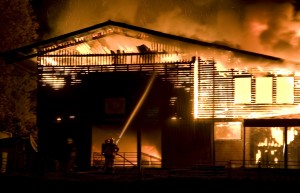Recently added item(s)
You have no items in your basket.

This is probably not a question that many businesses really want to consider but it is, however, absolutely essential to do so.
It is unfortunate, but not uncommon, for businesses to be completely obliterated by a single fire. According to statistics provided by insurance companies, of those businesses that are hit, around 80% cease trading within as little as 18 months. With that in mind, it makes sense for a business to do everything it can to prevent disaster striking.
Your responsibilities
In accordance with the Regulatory Reform (Fire Safety) Order 2005, if you are an employer, a building owner, a landlord, an occupier or anyone else with control of a premises - such as a facilities or building manager or a managing agent - you are responsible for fire safety in a business or other non- domestic premises*. So what steps can you take in order to protect not just the lives of your employees, but your building, its contents and your insurance cover too?
Well it’s not simply a question of having a couple of old water extinguishers on hand or having a battery smoke detector on the ceiling! According to Home Office Fire Statistics for Great Britain, there were 22,000 fires in commercial buildings between April 2013 and March 2014. In 64% of those premises with installed detectors, the technology failed to operate, for reasons including poor positioning of equipment, incorrect installation and/or incompatibility of fire technologies.
The Fire Industry Association (FIA) recommends a robust fire risk assessment, carried out by a competent individual, to ensure that all parts of the building have been accounted for and the risks have been considered and planned for. The risk assessment will highlight not only what fire protection equipment is needed but also where.
Alternatively, the business’s ‘Responsible person’ is also deemed to be competent to carry out their own fire risk assessment under the 2005 Fire Safety Order. In this case, the self-assessment will need to consider each and every area of fire detection, containment and control, so here’s a simple checklist to get you started:
Start with the building
• How is it constructed?
• How is it divided up?
• Are measures in place to stop or slow the spread of fire?
You may be unsure about the construction of the building and what measures are in place for fire protection, such as in-built dry risers for example. In this case you will need to obtain this information, probably from the construction company or building owner. If your building does have in-built dry risers, it’s also worth noting that according to the Fire Service up to 60% of these have never been tested but since these are also the responsibility of the Responsible Person, they can certainly invalidate your insurance if they are not being maintained.
Does your premises need a fire alarm system?
If it does, consider:
• What category is required?
• Has the system been designed by a person qualified to design systems?
• If already installed, has the system been installed correctly?
• Do you have documentation in the form of certificates for the Design, Installation, Commissioning and Handover of the system and were the certificates issued by reputable companies?
• Is the system regularly maintained and is there evidence available to support this, such as the fire alarm log book?
Are there fire extinguishers available for use?
• Are they suitable for the risks?
• Are they correctly maintained?
• Are the extinguishers due for a discharge test?
• Have the persons who are expected to use the extinguishers, received training in the correct type of extinguisher to use and how to use them?
Getting insured
It might appear to be a straightforward process to simply go to an insurance broker and get your business insured and certainly having adequate fire protection equipment installed and maintained by a competent company will reduce the risk of fire causing damage to the business. However, the fire protection equipment you choose may have an effect on your insurance. Insurance companies vary greatly with their criteria, and some may refuse to insure a company or it may even be difficult to insure a business that does not have adequate fire protection under certain circumstances.
We strongly recommend that you use quality equipment installed by a BAFE qualified engineer and that you get help and advice with design, such as that offered by our experts here at Fire Depot. This is especially important when you consider that the Regulatory Reform (Fire Safety) Order of 2005 places ultimate responsibility for competency and engineering skills of the installer or service provider onto the owner of the fire system - and there is nothing to prevent unqualified and inexperienced organisations from operating in the fire industry. Although Professional Organisations such as the Fire Industry Association (FIA) require members to be third-party accredited in the field in which they operate, these are voluntary schemes and some installers still carry out their activities without having been trained or accredited, so beware!
Finally, we suggest you ask your insurance company or broker to arrange a visit and confirm they are happy with your arrangements, and then act on any recommendations they may give you. Insist they confirm in writing once they are happy with your fire safety arrangements.
Tim Mann has more than 30 years’ experience in the electrical industry and has specialised in the fire protection industry for the last 20 years. As Group Technical Manager at Sentura Group, his role is to provide help and advice to ensure that customer’s installations are done right first time and to assist in solving their existing equipment and installations problems.
*Fire safety rules are different in Scotland and Northern Ireland.